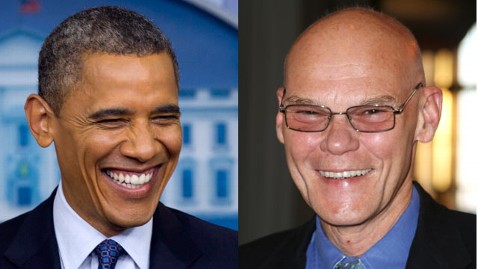James Carville and Stan Greenberg Have A Message For Obama: Talk More About The Next Four Years

Image credit: Carolyn Kaster/AP Photo; Donna Ward/Getty Images
Democratic strategists James Carville and Stan Greenberg have a message for the Obama campaign: Stop trying to convince voters that the last four years have been good for them, and start talking about what you are going to do in the next four years to make the economy and their lives better.
In a memo for the think-tank Democracy Corps, Carville and Greenberg write: "We will face an impossible headwind in November if we do not move to a new narrative, one that contextualizes the recovery but, more importantly, focuses on what we will do to make a better future for the middle class."
Carville and Greenberg were both members of the 1992 Bill Clinton presidential campaign that made the phrases "war room" and "it's the economy stupid" famous.
In focus groups of Pennsylvania and Ohio voters, the Democracy Corps found an American public that is struggling to pay for everyday items and racking up student debt. Regardless of their education or economic status, these folks haven't seen signs of an economy recovery - and don't expect to see one anytime soon.
"These voters are not convinced that we are headed in the right direction. They are living in a new economy - and there is no conceivable recovery in the year ahead that will change the view of the new state of the country."
Even so, write the authors, these voters don't know all that much about Mitt Romney. And, what they do know about him isn't all that positive.
"Respondents immediately volunteer that Romney is rich, out of touch, and in the pocket for Wall Street and big finance. "
The voters in these focus groups sound a lot like the Wal-Mart mom's we listened to last week: they know that three years may not be enough for Obama to have fixed the economy, but they don't know what he'll do to make it better.
That means, say Carville/Greenberg, Obama shouldn't try and beat Romney on the "are you better off than you were four years ago" argument. Instead, they should try to beat him at the "how are you going to make things better over the next four years."
"It is elites who are creating a conventional wisdom that an incumbent president must run on his economic performance - and therefore must convince voters that things are moving in the right direction. They are wrong, and that will fail. The voters are very sophisticated about the character of the economy; they know who is mainly responsible for what went wrong and they are hungry to hear the president talk about the future. "
It is true that voters and campaigns are more complex than they are often portrayed in the media. That said, elections are also pretty simple. Voters are either happy with the status quo or they aren't. When they aren't happy with what's happening to them now, they look to their other options.
Moreover, Obama's message on what he's going to do in the future remains murky. The Wall Street Journal reported today that Obama plans to "use a campaign policy speech Thursday to contrast his preferred approach for the country's economic future with ideas proposed by his likely Republican opponent, Mitt Romney." Even so, he is not expected to introduce any new policy positions or prescriptions.
Of course, there are plenty of Republicans who argue that Romney has not done a particularly good job of articulating his own positive, forward-looking message either. Wisconsin's Gov. Scott Walker told the Weekly Standard "It's not enough to just be the other guy. He has to offer a plan, he has to show a willingness to take on the big challenges facing the country. I think he can win here if he does that."